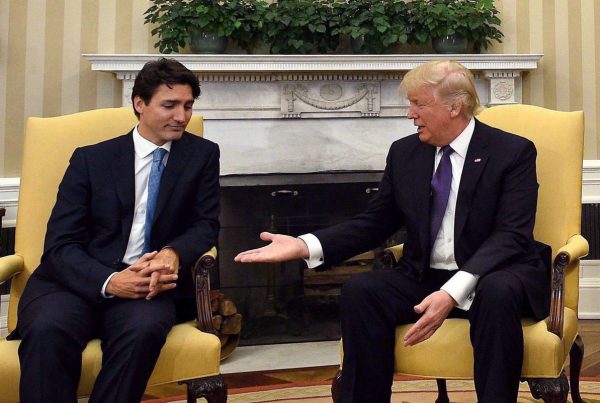Being landlocked is a bad place to be generally speaking on the international stage. Coastal states are guaranteed freedom of the seas, but landlocked states may not be able to reach the seas and their commercial bounty without having to bribe neighbouring coastal states. Ottawa was created in 1867 to prevent such extortionary behaviour by Canadian provinces. So what gives when BC is yet again threatening to close off Alberta’s access to tidewater? My views on the issue were laid out in my 12th May column for the Globe and Mail’s ROB. You can read the unedited text below or here online.
Geography distributes its bounty capriciously and the results can be extremely painful for those who end up penalised by their place on the map. The outcome of the recent BC election may be about the deliver an object lesson in this principle to this country’s only two landlocked provinces: Alberta and Saskatchewan.
Internationally, being landlocked is a very uncomfortable place to be. Unless you are a Botswana exporting diamonds (small, light and high value products that can be shipped by, say, plane) you likely need to put your exports on a ship to get them to world markets, thereby realising their highest value.
Because ocean shipping is so vital to economic success, the world’s nations agree that ships engaged in bona fide commerce will not be obstructed. Nations can’t target the shipping of other countries and demand ransom to let it reach its destination. That’s piracy.
The main exception is when military or diplomatic conflict causes countries to throw up embargoes against offending countries’ goods, or to prevent them from receiving shipments of things like arms or nuclear materials. Such exceptions are exceedingly rare when seen against the volume of ocean-borne trade.
But landlocked states face a completely different obstacle: their goods must cross another country’s territory to get to port. International law is of little help, and the 45 such landlocked states must negotiate access with neighbours who may have conflicting economic interests, historical enmities or simply little interest in helping.
What the neighbours universally have, however, is the whip hand in the negotiations. They tend to use that to extort benefits far in excess of the actual economic value of the infrastructure and services needed to get their landlocked brethren’s goods to port. And having to get their products through a “transit country” makes companies reluctant to invest in the landlocked. It injects a level of political risk that is difficult and costly to manage.
Landlocked countries thus tend to be poorer than their economic fundamentals justify. All because of accidents of geography and the political leverage they create.
Before 1867, the various colonies that were to become Canada suffered from the ability of each to impose tariffs on the products of the other as they crossed their territory. A key benefit of Confederation was explicitly to tear down these barriers, turning Nova Scotian or Quebec products into Canadian products that could move freely across the national territory, including to ports for export to world markets.
But as we’re discovering, the thirst of transit provinces for bounty to allow neighbouring provinces to move their products has never gone away.
Our only Pacific province has lately been the most egregious offender, preying on the vulnerability of landlocked Alberta and Saskatchewan in their efforts to get their resources to world markets.
Take the Kinder-Morgan pipeline, intended to bring Alberta petroleum to Asia via the port of Vancouver. Before the just-concluded BC election, the Liberal premier, Christy Clarke, had already shaken down the pipeline company for $1-billion to “allow” the pipeline expansion to be built. The province has no jurisdiction, pipelines being a federal matter, but the province could threaten enough obstructive behaviour that the company could see that peace with the province might be worth a hefty price tag. This is nothing but Third World corruption carried out at the expense of Canadian resources, a corruption only made possible by the arbitrary fact of Alberta’s landlocked geography and Ottawa’s complaisance.
Now BC has doubled down on transit province bounty-seeking, this time targeting thermal coal. The province has threatened a thermal coal export tax, ostensibly to punish the Americans for their softwood lumber machinations, but the result will be to sideswipe Alberta, which might lose as much as $300-million in sales of such coal now going through the west coast. Saskatchewan hasn’t been targeted yet, but they understand all too well that they are no less landlocked, and therefore vulnerable, than Alberta.
Assuming recounts and other factors don’t change the BC election result, the situation will only worsen. With the Green Party, unalterably opposed to Kinder-Morgan, holding the balance of power count on all the parties to vie to outdo each other in environmental virtue and the chauvinistic promotion of BC interests, as if they can be separated from the national interest of all Canadians. Kinder-Morgan is sure to be a flashpoint. This behaviour is a dagger aimed at the beating heart of federalism.
As for the much vaunted new free trade agreement between the provinces, it is silent on this issue, proving yet again what a paper tiger it is. Meanwhile Ottawa, created in 1867 in part to be the guarantor of the integrity of Canadians’ freedom to trade, looks on benignly.
Who speaks for Canada? Answer came there none.
Brian Lee Crowley (twitter.com/brianleecrowley) is the Managing Director of the Macdonald-Laurier Institute, an independent non-partisan public policy think tank in Ottawa: www.macdonaldlaurier.ca.


